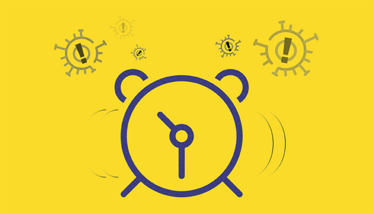A Terrifying Awakening
Contact with the sharp end of reality eliminates our assumptions and exposes our weakness. Contact with COVID-19 has done the same for pharma and healthcare.
Rainer Lichtenberger | | 8 min read

Where were you when the severity of COVID-19 first became clear?
By virtue of working in infectious disease, the realization came quickly to my colleagues and I. We had just been to China in November 2019 to scout for investors. When we first heard about lockdowns there early the following year, we were in San Francisco, at the JP Morgan Healthcare conference and had plans to fly back to China after the meeting. Those plans changed and we traveled back to Germany to investigate whether our pandemic asset—which we already knew worked against SARS-CoV-1—could also work for SARS-CoV-2.
Burning limelight
The COVID-19 pandemic was a perfect storm, but also a perfect opportunity. It was a chance for public health officials, pharma executives and life science researchers to show the significance of global health. Without the rapid collaborations between companies such as Moderna and BioNTech to find a vaccine, the willingness of researchers to work tirelessly and the candor of public officials, societies would not have been able to respond to the COVID-19 crisis as swiftly as they did. But to win the longer game of pandemic preparedness for the next crisis, we need to focus on the aspects of the response that were less successful.
One area that lacked a robust response was the development of effective therapeutics. I would argue that a weakness of the new mRNA vaccines is that they are not a one-shot solution. Luckily, COVID-19 morphed into Omicron – a relatively tame house pet compared with its first fatal iterations. Without this attenuation, the lack of effective therapeutics would have proven disastrous. We will certainly need them in the future; COVID-19 has intensified a pre-existing debate about the future of megacities and whether the concentration of so much population and economic activity in a few large centers is desirable. While it may take some time to resolve that question, expediting infectious disease therapeutics could be more feasible.
To start, we need blueprints of emerging and potential viruses so that we can develop broad-acting antivirals that could serve as an early defense line, protecting our hospitals and national healthcare systems from collapse, as they came so close to doing in 2020 and 2021.
Next, we need to develop drugs with more specificity. Pfizer’s Paxlovid was a good example, although its importance has since diminished because of its poor effectiveness against Omicron. That’s not Pfizer’s fault – it’s simply down to the variability of the virus and the specificity of the drug. And that’s why drugs that target host cells are ideal; they can make use of the commonalities of an entire class of viruses and target their signaling pathways.
The Origins of Atriva
In 2001, an article by the future scientific founders of my company, Atriva, was acknowledged in Nature Infectious Disease under the headline “Inhibiting RAF and fighting ‘flu.” It was the first published discovery on the means by which host cells target infectious diseases and how antiviral therapies could be used to fight viral diseases, such as influenza or COVID-19. Our founders had been working in this area for more than 25 years.
In 2015, I left the company that I was leading at the time [and, via existing industry networks I became involved with the scientific founders.Together we founded Atriva Therapeutics. We set the company up in Tübingen, Germany, because of the biotech-friendly ecosystem in the city, the infrastructure, and the centuries-long spirit of industry and entrepreneurship in the surrounding state of Baden-Württemberg. We received €25,000 in support from the regional biotech hub and, with an additional €100,000 that the founders injected into the company, we survived our first year.
Following this, we received our first venture financing. And then the serious work began as we worked to find cures for the next influenza pandemic. When COVID-19 arose, we trained our sights on it.
One species
International collaboration will again be the only way through future pandemics. Thankfully, during the COVID-19 crisis, we did not see any Western countries attempt to “go it alone” in terms of science, technology, or information. In more autocratic countries the story is a little different. We should bear in mind that an authoritarian government not prone to acknowledging its own errors might run into political turmoil if it, say, admitted that its systems might not be able to cope with a given disease. We can see this with China’s unswerving and long-term adherence to a “zero COVID” policy.
Nation states aside, we’ve seen some excellent examples of corporate cooperation. The way that BioNTech and Pfizer collaborated to develop their vaccine was very successful – and it was fast. They took joint risks, and that is something other pharma companies could learn from. The willingness of big pharma companies to engage quickly with the pandemic was admirable. These companies are “supertankers” – they’re not traditionally or structurally inclined toward rapid maneuvers.
As well as preparing for the next pandemic, it would also be beneficial if big pharma could apply the collaborative mindset from COVID-19 to other important areas. I think both the public and the private sector need to turn their attention to the antibiotic resistance crisis. The antibiotics that we have are no longer sufficient to fight multi-resistant bacterial strains. It is on governments to bring about affordable pricing, and it is on pharmaceutical companies and their investors to target more than just the most attractive markets, like oncology. All too often, these companies simply jump onto one bandwagon; we need more companies who will be the first to jumpstart an alternative bandwagon. Once it starts moving, we can get somewhere.
Testing, Testing…
Testing and diagnostics must not be neglected – and fortunately the industry was able to provide a supply of test kits sufficient for mass regular testing. There were certainly regional and geographic inequalities in this supply, but I would put this down to organizational problems that lie outside the hard sciences. I would hope that the wealthy nations of the EU, the US, and other wealthy countries can contribute to making the entire world better prepared for the next pandemic. This mission is not just about science and technology; it is about mankind’s ability to pounce on an emerging virus absolutely anywhere, and shut it down before it is able to spread everywhere.
Recent improvements in testing and diagnostics, brought on by the urgency of the pandemic, can help us here. My company is currently running a study on a test kit that covers SARS, influenza, and RSV. These kits can be made available at the hospital, and can check the patient’s viral state at the bedside within a few minutes. Two years ago, this would not have been possible – the wait for a readout would have taken at least 48 hours. Advances like this demonstrate why we need to keep on investing serious money into pandemic preparation. Especially within Germany and the European Union, I see a need for political activity to keep attention and resources directed toward improving our anti-pandemic infrastructure.
Fool me once…
I believe the knowledge we need to take away from this first pandemic of the 21st century can be distilled into three main lessons that we must internalize and act upon.
The first lesson is about learning itself; we must learn from pandemics not commercially, but socially – as societies, institutions, and countries rather than as industries and companies. We can see a good example in the US, where they have established a good model for institutions and data at the federal level. We should try to emulate this on a pan-national basis in the EU. We have the money to do it, but right now that is not the issue – the problem is the complexity of the organization. Hierarchical government structures won’t serve us well in the face of a pandemic – instead we need speed and expertise.
The second lesson is that we must adequately fund our health systems. We need to know that they will not be immediately overwhelmed in the first wave of the next pandemic. We should not be designing health systems as money makers. Instead, we should be setting them up to serve the people and society. Ideally, they should be fully funded by taxes. We have seen that the societies with the priorities I have described generally had the best pandemic responses. It is expensive, but it pays off. Ideally, we need a good mix of entrepreneurial leadership combined with proactive governance and public institutions.
The third (and final lesson here) is that we need to look to and assist the poorer countries of the world. If we only pay attention to the West, plus a selection of rich Asian countries, the next pandemic will sweep across the world just like COVID-19 did. We need to build up more efficient global structures – and quickly. We can’t succeed as a fragmented species, no matter how sophisticated our science and technology may become – this is my firm conviction.
President & CEO, Atriva Therapeutics GmbH



















